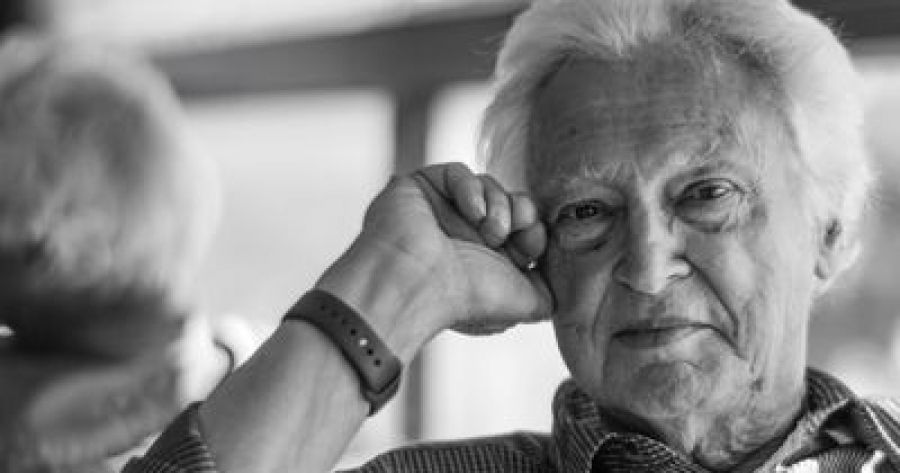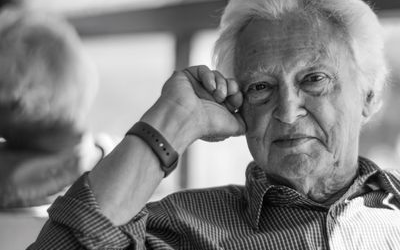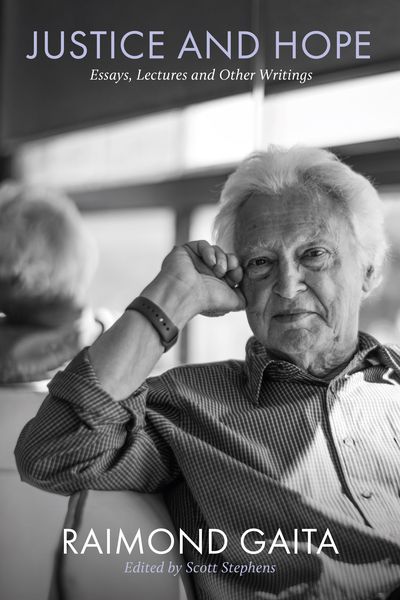
- Free Article: No
- Contents Category: Essay Collection
- Review Article: Yes
- Article Title: Gaita on love
- Article Subtitle: Notes from a life of the mind
- Online Only: No
- Custom Highlight Text:
For a man many would regard as the very epitome of the type, Raimond Gaita seems rather hostile to the concept of the intellectual. It is ‘irredeemably mediocre’, he explains, inferior to the kinds of moral and political responsibility that attach to teacher or politician. Intellectuals are active in the public domain, grappling with ideas, culture, and politics, but they have often lacked independence of mind, he says, ‘because they never had it or because they sacrificed it to the cause’.
- Featured Image (400px * 250px):

- Alt Tag (Featured Image): Frank Bongiorno reviews ‘Justice and Hope: Essays, lectures and other writings’ by Raimond Gaita
- Book 1 Title: Justice and Hope
- Book 1 Subtitle: Essays, lectures and other writings
- Book 1 Biblio: Melbourne University Publishing, $65 hb, 599 pp
- Book 1 Cover Small (400 x 600):

- Book 1 Cover (800 x 1200):

It was arguably in those early years of the century that Gaita came into his own as an Australian public intellectual, a moral philosopher able to address an Australian audience of the educated and troubled and anxious kind as their government lied to them, took them to war, locked up asylum seekers, and sent the army into Aboriginal communities. To the right, Gaita would probably fill the role of Howard-hater, but in the essays of that time we find a genuine concern about the decline of dignity and honesty in political life that cannot be reduced to this or that politician. We see the continuities between the worlds of George W. Bush, Tony Blair, and John Howard, and of Donald Trump, Boris Johnson, and Scott Morrison, without Gaita needing to spell them out. In attacking the very conditions needed by citizens to ‘call their fellow citizens to seriousness’, Trump has polluted political life, rather as Primo Levi thought the fascists’ lies did in Italy.
Levi is one of Gaita’s lodestars – Simone Weil, Hannah Arendt, and Albert Camus are others – and among the earliest essays is a 2019 reflection on If This Is a Man, a book to which Gaita often returns. Viewed in the wider context of Gaita’s preoccupations, it is easy enough to see why this greatest of Holocaust memoirs should play such a role. For Gaita is an author who returns repeatedly to love. The passage in If This is a Man that has made its greatest impression on him is one in which Levi’s friend Charles tenderly cleans up a young Dutchman named Lakmaker suffering horribly from dysentery. For Gaita, the pure love of ‘saints’, such as Charles, lies in their recognition of a fellow human being’s ‘preciousness’ even in a moment of the deepest degradation.
For Gaita, such claims move well beyond rights discourse, which, he suggests, has a thinness compared with this kind of love. It is justice, rather than mere fairness; a full recognition of humanity, and not just egalitarianism. These are the ideas to which Gaita returns when he considers same-sex marriage (in 2005), as well as when he contests the claim – one that gained particular momentum during the ‘war on terror’ – that torture could be justified under some circumstances, such as to save lives. Here, in a moving essay, Gaita recalls when working in a psychiatric hospital as a young man his encounter with a nun who was somehow able ‘to reveal the full humanity of those whose affliction had made their humanity invisible’; in demeanour, word, facial expression, and body language, she was utterly devoid of condescension. It is the same gift Gaita attributes to Charles – one of ‘saintly love’ – a capacity to recognise humanity even in ‘the degradation of the afflicted’.
Most interestingly, Gaita compares the nun’s qualities not to the brutish behaviour of a number of employees in the hospital towards the patients, but to a small group of virtuous psychiatrists who had come into the hospital insisting on better treatment of the patients because, as one said, they had an ‘inalienable dignity’. Again, the contrast is between a recognition of rights and the deep love of another that recognises their humanity as well as one’s own.
What we find here in Gaita is an ideal of how we might live with one another, and in the world, in an ethical manner. It is demanding in many ways because it calls us to ‘seriousness’ and ‘lucidity’ – key words in his writings – when the temptation offered by a complex, corrupt, and confronting world might be to retreat into misanthropy or at least detachment. For Gaita, engagement with the world – a love of it, despite its wrong and evils – is a moral responsibility, a large part of what makes us fully human.
It is a world, too, in which a common humanity is expressed through political communities that we usually call nations. It is striking how much of Gaita’s writing is concerned with the particular obligations that attach to belonging to a nation. For him, jingoism is bad but not love of country, which brings with it certain responsibilities among which is a collective ownership of both the good and the bad in a country’s history. These are responsibilities that a recent immigrant will be unable to feel; it takes time, perhaps generations, to become sufficiently embedded in a place to take them on in a meaningful way. It was, of course, a live question in the Howard era, when the idea of an apology to the Stolen Generations ran into the conservative argument that one should not apologise for something that one has not done. It remains alive for us today. Nonetheless, as Gaita remarks, the same people who deny such responsibility seek to foster a sense of pride in ancestors’ achievements.
The essays – edited and introduced by the ABC’s Scott Stephens, himself a moral philosopher – are a distinguished and valuable contribution to Australian public discourse, given new life here. They were often responding to a particular controversy, issue, or moment, and there are very big issues of our times – such as climate change – that do not much figure. Yet it is striking how many of the pieces resonate in the present, or just grapple with issues that remain as debatable today as they were in the time of Socrates.
Sometimes, tragically so. There are reflections on Indigenous reconciliation that still are pertinent to that unfinished, and perhaps unfinishable business, in the aftermath of the Voice referendum. And Gaita’s reflections on the conflict between Israel and Palestine remain tragically relevant. Informed by his respect for national community – to which he sees both Israelis and Palestinians as entitled – he wonders why Israel is ‘the only state in the world whose injustices have given rise to serious doubts about its right to exist’. In 2010, he was warning of the danger of a one-state solution that would not be of the kind envisaged by Palestinians and their Western supporters on the left, but one favoured by the Israeli right. That danger seems to loom even more seriously now than then.
There is a worldliness about this book: a recognition that people feel as well as think, that literature, art, and film, and not only philosophy, are necessary both to understand the world and to change minds, that those untrained in moral philosophy will be understandably resistant to its fine distinctions, and that politics is no vocation for saints – but that if it attracts only the worst kinds of sinners, we are all lost. It is a generous vision, often practical, compassionate – a word that Gaita would probably reject in favour of loving – and mainly hard-headed and unsentimental. It will challenge receptive readers to consider how we might better live together in deeply troubled times.


Comments powered by CComment